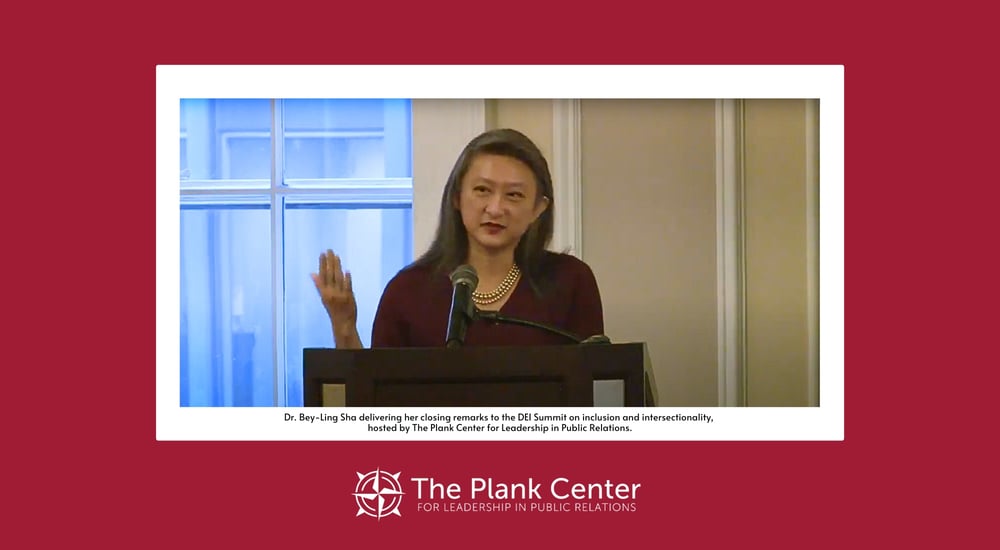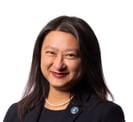August 14, 2023
Why Identity and Intersectionality Matter for Diversity and Democracy
Written by:
Dr. Bey-Ling Sha

The thoughts below were previously shared by Bey-Ling Sha, Ph.D., APR, Fellow PRSA, Dean, College of Communications, California State University, Fullerton, in her closing remarks delivered to the DEI Summit on inclusion and intersectionality, hosted by The Plank Center for Leadership in Public Relations. Video of the original closing remarks can be watched here.
The Plank Center for Leadership in Public Relations works to “develop and recognize outstanding diverse public relations leaders, role models, and mentors to advance ethical public relations in an evolving, global society.” Toward that end, the Center has hosted summits on public relations leadership, as well as on diversity and inclusion in public relations.
Diversity and Democracy
Communication professionals, educators, and students who participate in The Plank Center’s DEI Summit do so because we believe in the importance of diversity, equity, and inclusion. At the 2022 Summit, attendees heard from public relations practitioners who shared their personal experiences with DEI and offered excellent advice on inclusion and intersectionality. Attendees also heard from public relations scholars whose research showed that, frankly, not much has actually changed in our profession with regard to DEI, and they shared some ideas for organizations to keep getting better.
For my part, I would like to underscore that DEI is critical, and not merely to our professional practice of public relations, so that our organizations can successfully survive. DEI also is critical to our national practice of democracy, so that, as President Lincoln said at Gettysburg, "government of the people, by the people, for the people, shall not perish from the earth."
So, how exactly does diversity matter to democracy? For starters, if democracy is defined as "government of the people, by the people, for the people," then obviously, full democracy is only possible when it involves all the people.
And "all the people" should mean literally that: Everyone. Period. No matter what race, color, or creed; no matter what sex, gender identity, or sexual orientation; no matter what immigration status or ability, health, or wealth. A true democracy includes everyone, in the full diversity of that collective.
So, a truly fully functioning "government of the people, by the people, for the people" is only possible when it involves all the people, when all the people participate.
Participation in democracy is not just about voting, although that's obviously very important – that people who are legally enfranchised to vote, do so. And that they actually have access to the ballot and can cast their votes without interference or intimidation.
Participation in democracy is also about having equal and equitable access to privileges granted to all by the U.S. Constitution and in particular by the First Amendment: freedom of religion, freedom of speech, freedom of the press, freedom to gather or congregate, and freedom to petition for redress of grievances.
And inclusive participation in a democracy means that every individual can exercise their right to these freedoms, without fear of ridicule, without fear of suppression, and without fear of violence, whether to one's self, to one's loved ones, or to one's community.
In short, a fully functioning democracy simply cannot exist without acknowledging, accepting, and – most importantly – empowering that democratic society's full diversity.
Identity and Intersectionality
Now, let me talk about identity and intersectionality. Clearly, the concept of democracy is central to the core identity of the United States. Democracy is who we are. Or at least, democracy is who we claim to want to be. Democracy is our nation's avowed identity.
As we heard from speakers at the DEI Summit, identity can be complex. And the complexity of identity is true for countries, as well as for individuals. Just as countries are composed of diverse groups of people, so are individuals composed of a multitude of identities – and those identities intersect in different ways, which gets very complicated.
Yet, as Sonia Diaz (timestamp 1:49) said at the Summit, one problem in doing DEI work is that everyone wants there to be a formula. But there is no formula. There is no easy solution to DEI-related challenges because intersectionality is complicated, and DEI work is a long game.
The public relations industry has come really far, in recognizing that identities are multifaceted and that each individual’s myriad identity facets intersect in different ways.
But now, I challenge us – especially those of us who hold positions of leadership in our organizations – to go beyond acknowledging intersecting identities, to analyzing how various identity intersections impact people and organizations.
And this brings me to my third point:
Analysis and Action
Intersectionality is not just about the intersection of various identities. As Dr. Natalie Tindall (timestamp 7:17) emphasized at the Summit, we cannot talk about intersectionality without talking about power and about power differences.
So, intersectionality is about analyzing all the ways in which the intersections of identities impact different individuals in different ways because different identities have differing levels of privilege and power in our society's systems and structures.
Organizational leaders need to understand how identities intersect in individuals so that we can understand how individuals intersect with each other in the workplace. Because it’s those employee intersections and interactions that can make people feel included or excluded.
At the Summit, Dr. Nilanjana Bardhan and others reminded us that employees need to feel included, to feel that they belong. In her Summit remarks, Charlene Wheeless (timestamp 29:42) talked about imposter syndrome, and she emphasized the importance of being true to who you are – to all of who you really are – so that all of your identities can belong.
But, I would say that there are no imposters in the workplace, not really. Rather, I believe that there are only people, fully complex humans, whose colleagues and leaders and even allies have failed, to make feel welcome, to help them feel that they belong.
Teneshia Jackson Warner (timestamp 7:16) talked at the Summit about allyship being when a person with greater privilege helps someone who is marginalized or someone with lesser privilege. I’d encourage us all to take some time to reflect on that definition of allyship and to analyze our own intersecting identities.
Because I believe that each of us has some identities of greater privilege and greater power, who can be allies. And at the same, each of us has identities of lesser privilege and lesser power, who need allies. And that is the power of intersectionality as an analytic framework.
So, acknowledging intersecting identities is good; it's an important start for organizational leaders. Analyzing identity intersections is great; it's a critical next step to deepen our understanding of diversity.
But, it's not enough these days to be good or even to be great. These days, we have to be grounded in our goals. And for identity and intersectionality – beyond the goodness of acknowledging, and beyond the greatness of analyzing – should be the grounded goal of acting, of taking action in support of not only diversity, equity, and inclusion, but also accessibility, and social and economic and climate justice.
For public relations professionals, this should be a no-brainer. Remember, public relations is not only about words; it’s also about the actions that, in the words of Arthur Page, “prove it.” Public relations is not just about sending communications out on behalf of our organizations. Public relations is also about enacting changes within our organizations.
So, I will wrap up this blog by echoing the message that David Albritton shared in kicking off the 2022 Summit: Each of us needs to make a commitment to action, to use our personal actions to influence our organizations' actions.
And I think we do that – each of us – by leveraging intersectionality. How? Well, remember, each of us contains multitudes (thanks, Walt Whitman). We each have myriad identities.
I believe that each of us needs to leverage our identities of greater privilege and greater power, to influence positive action and engender change. And we can do that while honoring our identities of lesser privilege and lesser power so that we remain grounded in remembering why those changes are necessary.
And make no mistake. Change is necessary. Specifically, organizational change toward real, fundamental, substantive action in support of DEI – this is necessary. And change requires action. Always.
Closing Thoughts
To be honest, the Summit comments that most resonated with me at the time came from Soon Mee Kim (timestamp 5:37), who said, "I'm getting a little annoyed." (Hey, I was just being my authentic self, and I was authentically feeling annoyed).
But Soon Mee also said, “Let's look at the letters we've been talking about: D-E-I.” She said, "We need to play bigger. Instead of D-E-I, we need T-W-T: Total World Transformation." (timestamp 7:07) And I totally agree: What’s needed in the world is a total transformation in how we collectively think about issues related to diversity and why diversity matters to us all.
Obviously, the idea of a “Total World Transformation” in our collective thinking about DEI can feel a little overwhelming. And so, I invite us to remember the words of Tupac Shakur: "I'm not saying I'm gonna change the world, but I guarantee that I will spark the brain that will change the world. And that's our job. It's to spark somebody else watching us."
So, let's get out there and spark things up for Total World Transformation. Because our (public relations and communication) profession, our organizations, our society, our democracy – all are depending on us to do the actions, to be the spark, to transform with cultural humility ourselves and our own myriad, complex identities.
And in doing all of that, we can and we will transform our world, together.
—Bey-Ling Sha
About Dr. Bey-Ling Sha

Dr. Bey-Ling Sha received the 2022 Bruce K. Berger Educator Mentor Award from The Plank Center. The College of Communications at Cal State Fullerton was founded in 1988 with the mission of preparing communicators to advance a democratic society. It is the only stand-alone communications college in the 23-campus system of the California State University, the nation’s largest and most diverse four-year university.
Tag(s):
Featured
Other posts you might be interested in
View All Posts
Leadership Communication
4 min read |
February 6, 2023
The State of Disinformation in the U.S. and Canada
Read More
Internal Communication
5 min read |
March 21, 2022
4 Steps to Harness the Power of Purpose and Drive Business Transformation – Guest Blogger, Tapestry's Jennifer Leemann
Read More
Employee Engagement
8 min read |
September 29, 2021

Comments on this post